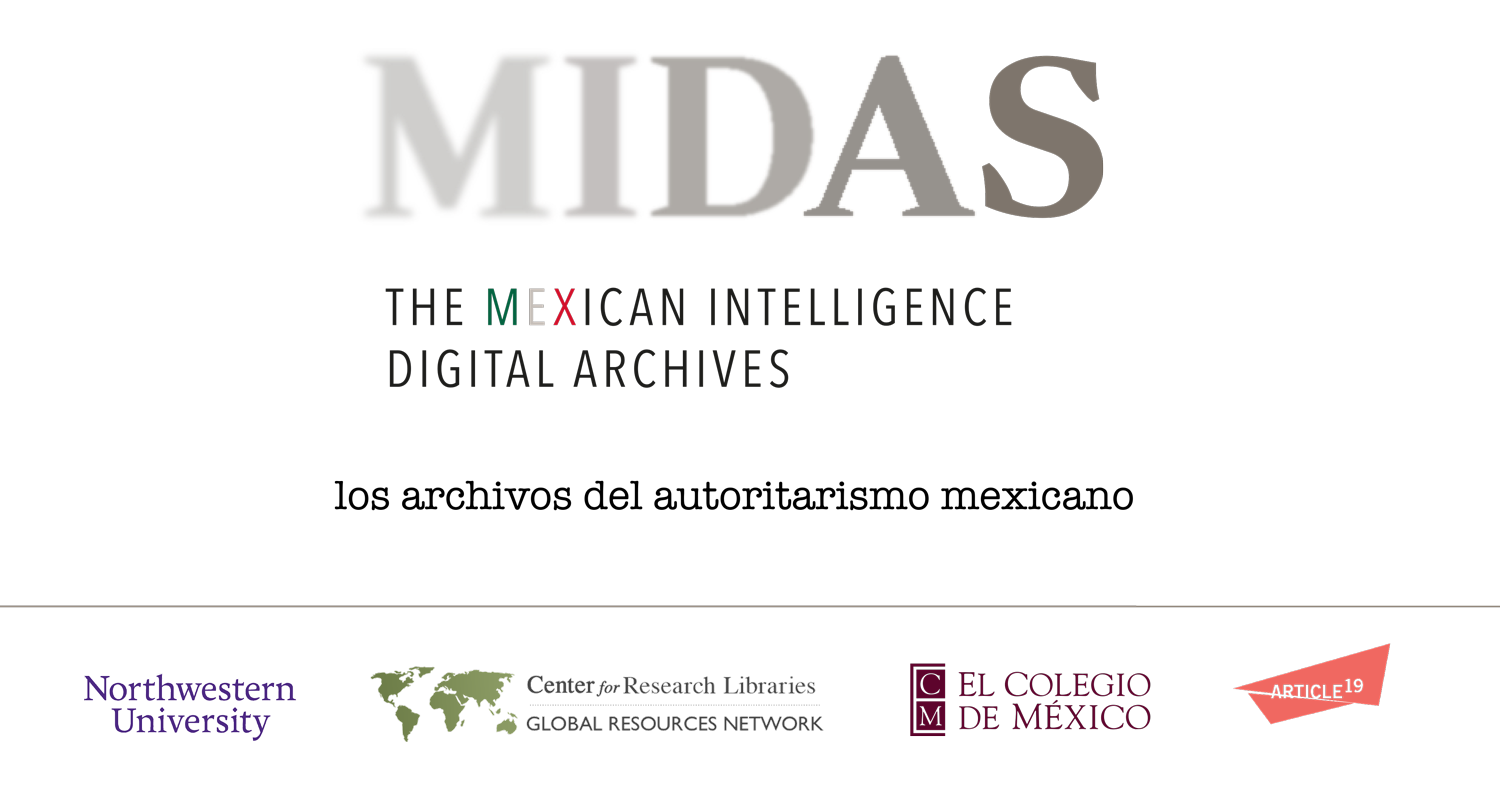
MIDAS, the Mexican Intelligence Digital Archives (los Archivos del Autoritarismo Mexicano), is a crowd-sourced, public access digital archive of historical documents from the Mexican intelligence agencies.
The collection is drawn from Mexico’s two principal security services, the Dirección Federal de Seguridad (Federal Security Directorate, or DFS) and the Dirección General de Investigaciones Políticas y Sociales (General Directorate of Political and Social Investigations, or DGIPS.) Their materials cover the period c.1940 to c.1985. The release of these archives in 2002 was a major step in Mexico’s transition from the authoritarian rule of the twentieth century.
Access to these documents was never flawless. For many years there was no catalogue for the three thousand plus boxes of the DGIPS files, and researchers relied on the dedication of the Archivo General de la Nación (AGN)’s personnel and the generosity of colleagues. The situation for the DFS was yet more complex. In those early years there was not just no catalogue, but the intelligence service furthermore continued to control the documents, selecting without oversight which could be seen and which should continue hidden.
Despite this, these intelligence documents provided citizens, journalists and academics with a wholly new understanding of one of the longest-lived single party regimes in history.
Between 2009 and 2013 the AGN acquired greater control of the archive. AGN staff drew up a functioning catalogue and obtained co-jurisdiction with members of the contemporary intelligence service. The 2012 Ley Federal de Archivos defined the national archive as a source of public information, exempting it from legislation requiring the confidentiality of personal details, and by mid-2013 fluid access to the DFS was virtually complete. A researcher could directly request documents based on the catalogue and be given them directly, much in the same way as in any other archive.
In 2015, however, the Mexican government decided to impose strict new limits on access to these archives through a combination of legislation, executive decree and new guidelines for users. The Secretaría de Gobernación (Interior Ministry) decreed that the intelligence archives should be redefined as separate from the national historical archive and subject to different rules.
Among those rules was the protection of all data regarding individuals for seventy years. From then on the only documents available to Mexicans were those already released in the versiones públicas, the folders of documents redacted and vetted for public consumption. New rules for users, moreover, imposed significant delays in the nuts and bolts of taking out the documents. It currently takes three days to obtain an appointment at the archive, after which researchers must order documents with 24 hours advance notice, and are only permitted to order an extremely limited number of documents at any one time. Moreover, archive staff are often unable to locate some versiones públicas, informing researchers that their whereabouts are unknown and that there is no mechanism in place to locate them.
The result has been a sweeping censorship, vigorously opposed by historians, academics, victims of state violence and civil society but nevertheless ongoing.
MIDAS is a response to that censorship. It is an international partnership, directed by academics from Mexico, the United States, Great Britain and Europe, and aided by individual researchers who contributed copies, photographs and scans of the documents made during the time the physical archives were available.
MIDAS brings together the Center for Research Libraries, Northwestern University, El Colegio de México and the freedom of speech NGO Artículo 19. The project is funded by Northwestern University's Buffett Institute for Global Studies, University Library, Nicholas Chabraja Center for Historical Studies and Weinberg College of Arts and Sciences. The Colegio de México and Artículo 19 contribute to the gathering and processing of documents and the publicization and oversight of the archive. Coordination of the archive’s creation and activities will rest with Northwestern’s Latin American & Caribbean Studies Center, while the Center for Research Libraries will undertake long-term custody of the digital files to guarantee open access to and maintenance of the archive.
MIDAS was publicly launched in the fall of 2018, coinciding with the fiftieth anniversary of Mexico’s powerful student movement and the massacre at Tlatelolco that ended it. MIDAS will eventually contain more than 300,000 documents the MIDAS team has gathered to date, spanning the 1940s to the 1980s. The collection contains material on a vast range of historical figures, ranging from peasant activists to presidents.